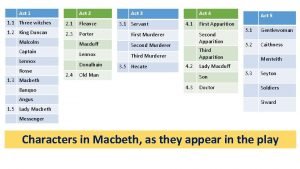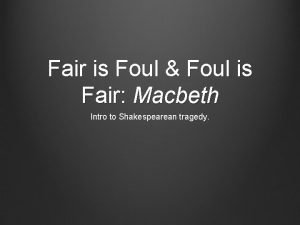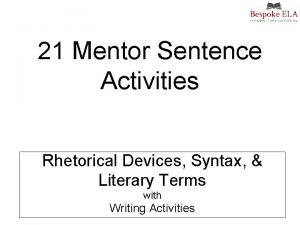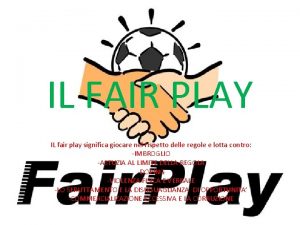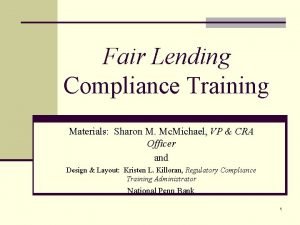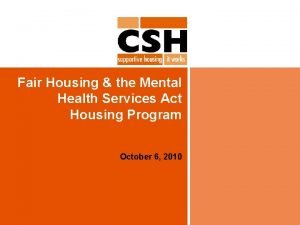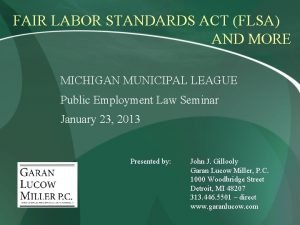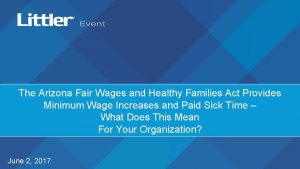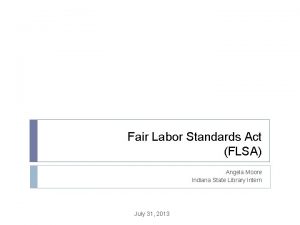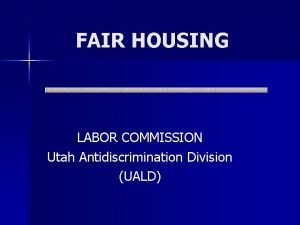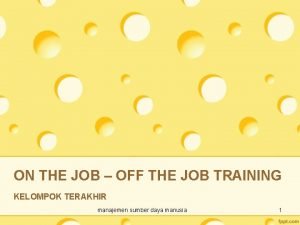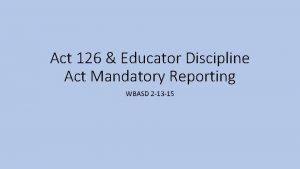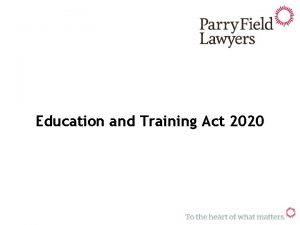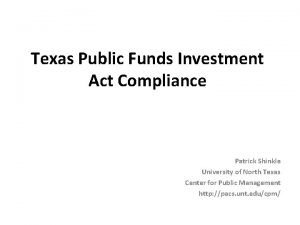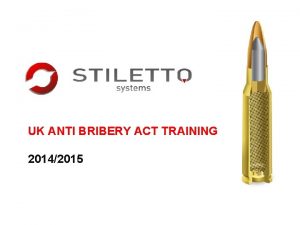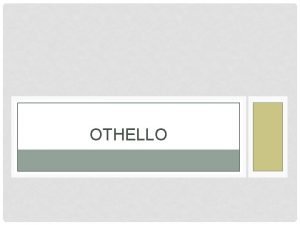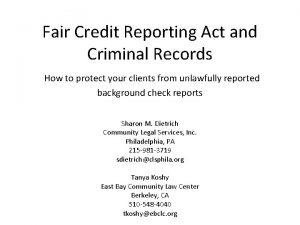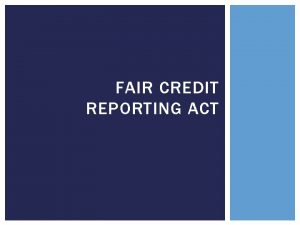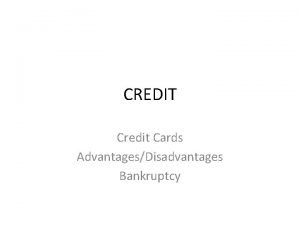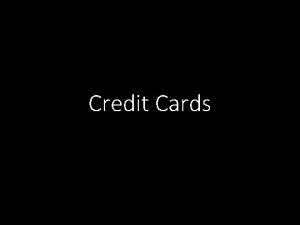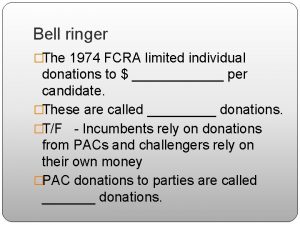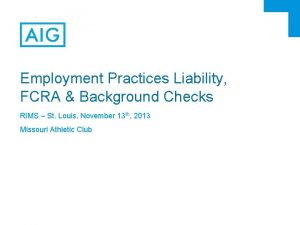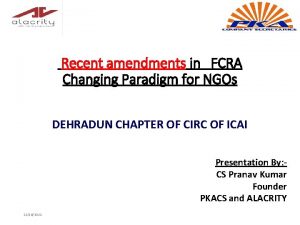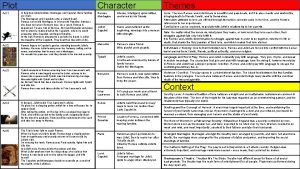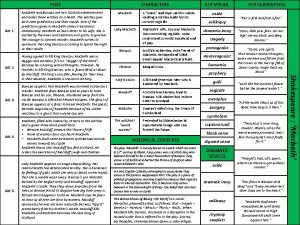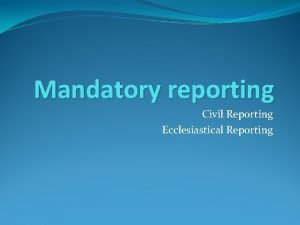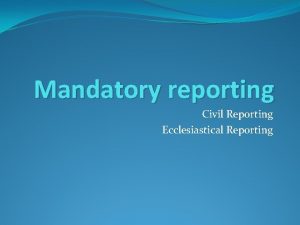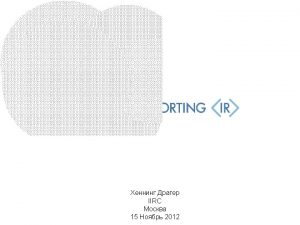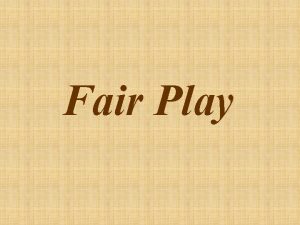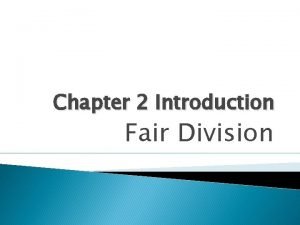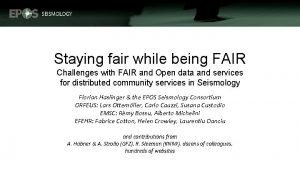Fair Credit Reporting Act FCRA Training Fair Credit




























- Slides: 28

Fair Credit Reporting Act (FCRA) Training

Fair Credit Reporting Act 2 The Fair Credit Reporting Act (FCRA) is a federal law that regulates the collection, dissemination, and use of consumer information. The FCRA promotes the accuracy and privacy of information in consumer credit reports. It also controls the use of credit reports and requires Credit Reporting Agencies (CRAs) to maintain correct and complete files. Confidential

FCRA Regulates 3 Regulates three types of activity: Credit reporting Furnishing of credit information Using credit information Confidential

Consumer Rights 4 Consumers have the right to know what is in their file. They may request and obtain all the information about their file from a Credit Reporting Agency (CRA). The three major CRAs are: 1. 2. 3. Experian Trans Union Equifax Confidential

Consumer Rights Continued… 5 Consumers have the right to dispute incomplete or inaccurate information. CRAs must correct or delete inaccurate, incomplete, or unverifiable information and usually do so within 30 days. If a consumer identifies information in their file that is incomplete or inaccurate, and reports it to the CRA, the agency must investigate the dispute unless it is frivolous. However, a Credit Reporting Agency may continue to report information it has verified as accurate. CRAs may not report outdated negative information. Access to a consumer’s file is limited: A CRA may provide information about the consumer only to people with a valid need - usually to consider an application with a creditor, insurer, employer, landlord, or other business. The FCRA specifies those with a valid need for access. Confidential

Consumer Rights Continued… 6 Consumers must give their consent for their report to be provided to employers. Consumers have a right to sue CRAs, users, and providers in state and federal court for violations of the FCRA. Consumers may request that CRAs do not distribute their name on lists used by creditors and insurers to make unsolicited offers of credit and insurance. Requests can be made by telephone or in writing by filling out a form available from each credit reporting agency. For telephone requests, consumers can call (888) 5 OPT OUT to be excluded from Experian, Equifax, and Trans Union. Telephone requests last for two years, written request are permanent. Confidential

Consumer Rights Continued… 7 Consumers are entitled to a free file disclosure if: A person has taken adverse action against them because of information on their credit report. They are the victim of identity theft and place fraud alert on their file. Their file contains inaccurate information as a result of fraud. They are on public assistance. They are unemployed but expect to apply for employment within 60 days. In addition, all consumers are entitled to one free disclosure every 12 months upon request from each nationwide credit bureau and from nationwide specialty CRAs. Confidential

Fair Credit Reporting Act 101 8 15 U. S. C. § 1681 s-2(a): accurate reporting requirement 15 U. S. C. § 1681 s-2(b): reasonable investigation requirement inposed on furnishers upon receipt of notification from the CRA of a dispute Direct disputes from consumer = obligation to investigate but no private right of action for consumer. See Nelson v. Chase Manhattan Mortg. Corp. , 282 F. 3 d 1057 (9 th Circ. 2002). Confidential

“Reasonable Investigation” 9 FCRA does not specify type of investigation required to satisfy § 1681 s 2(b). Most courts require a ‘reasonable’ “reasonable investigation. ” Scope of investigation is tied to relevant information CRA provides to furnisher as part of dispute notification. See Boggio v. USAA Fed. Sav. Bank, 696 F. 3 d 611 (6 th Cir. 2012). Furnisher must review all relevant information provided to it by CRA. Nature and specificity of information provided by CRA may affect scope of investigation. Furnisher cannot require consumer to confirm information in ACDV before investigation. Duty to perform a “reasonable investigation” includes informing CRA’s if the consumer has submitted a “bona fide” dispute that could alter how a reported debt is understood. See, e. g. , Gorman v. Wolpoff & Abramson, 584 F. 3 d 1197 (9 th Cir. 2009); Saunders v. Branch Banking & Trust Co. of Va. , 526 F. 3 d 142 (4 th Cir. 2008); Noel v. First Premier Bank, 2012 WL 832992 (M. D. Pa. Mar. 12, 2012). Confidential

Key provision for the USE of consumer reporting information 10 15 U. S. C. 1681 b(a)(3) Must have a permissible purpose to acquire the information Review of an account for collection purposes is a permissible purpose 15 U. S. C. § 1681 b(a)(3)(A) Huertas v. Galaxy Asset Mgmt. , 641 F. 3 d 28, 34 (3 rd Cir. 2011) Plaintiff’s burden to prove no permissible purpose Must allege User obtained the ifnroamtion without having a purpose to review or collect a debt. Good faith belief there was an account is enough for a permissible purpose; focus is on the intent of the user/party obtaining the report, not what the actual facts may be. Trikas v. Universal Card Servs. Corp. , 351 F. Supp. 2 d 37 (E. D. N. Y. 2005) Confidential

Prohibited Information 11 Credit applications cannot ask a consumer about their: Sex Race Color Religious affiliation National origin Unless they are applying for residential real estate. Even then, they are not required to answer. Confidential

Prohibited Information Continued… 12 In reviewing a consumer’s credit application, lenders cannot discriminate on the basis of: Sex Marital status Race Religion National origin Income from assistance programs If they have exercised rights under the Consumer Protection Act The only acceptable criteria is their ability and intent to repay funds borrowed. Confidential

Exceptions 13 Creditors can ask how old a consumer is in order to be certain they have reached legal age to enter into contracts. They can also consider a consumer’s age to estimate how long they will continue to work. However, age cannot be used to deny credit to those 62 or older or to those applicants whose age exceeds that required for credit insurance. Confidential

14 Takeaways Confidential

Takeaways 15 TMLG does not credit report. Our clients likely do credit reporting. What you do when collecting and litigating on accounts may affect what a client reports. Clients may need your advice to be sure they are compliant in reporting accounts and obtaining consumer credit reports. Consumers increasingly are raising credit reporting issues, both as counterclaims and in settlement negotiations. Confidential

Takeaways continued… 16 Furnishers do not have much time to conduct a reasonable investigation. A Credit Reporting Agency (CRA) has 5 days from receipt to send Automated Consumer Dispute Verification (ACDV) to furnisher. CRA must respond to ACDV within 30 days of receipt. Leaves a window of, at most, 25 days to respond and that is only if the furnisher gets a ACDV on the same day it is received. Confidential

17 Procedures Confidential

Dispute Handling 18 All TMLG employees are responsible for following all client and firm requirements when a dispute is received. The following are the proper steps in escalating a dispute: Notate the customer’s dispute in the account notes Notify disputes@collectmoore. com Client is notified Confidential

Types of Disputes 19 Not my account (Fraud/Identity Theft) Not my charges Prior settlement Account charged off in error Credit bureau dispute Failure to credit payments to account Confidential

Customer Dispute Handling 20 Does not have to be in writing. Treat oral disputes as “disputes. ” Brady v. Credit Recovery Co. , Inc. , 160 F. 3 d 64, 66 (1 st Cir. 1998) Any disagreement with the status of an account should be treated as a “dispute” and client should be informed immediately. No reason for the dispute needs to be stated. Dispute does not have to be valid. It is not up to you or client to determine merits for purposes of updating credit reporting. Do not have to use the word “dispute”. Confidential

21 Policy Confidential

Credit Information & TMLG 22 The Moore Law Group does not report to any reporting agencies. The Moore Law Group uses credit reports for collection purposes only and for no other purpose. Using credit reports for collection purposes only is a permissible use purpose pursuant to the Fair Credit Reporting Act. The Moore Law Group prohibits the discussion of the impact of a settlement, payment or non payment on a debtor’s credit report. Specifically TMLG prohibits use of the “reporting” of a settlement or payment or the potential credit score impact as a collection tool. The Moore Law Group will not pull a credit report on an account if a prior credit report has been pulled within the last six months. If there is reason to pull a credit report sooner than six months manager authorization is required however under no circumstance is a credit report to be pulled within four months of a prior credit report pull. Confidential

Credit Information & TMLG continued… 23 No employee of The Moore Law Group is to discuss the impact of a settlement, payment or non payment on a debtor’s credit report as a collection tool with a debtor. The use of “reporting” of a settlement or payment or the potential credit score impact as a collection tool is grounds for corrective action and may be grounds for immediate termination. Collectors may use the credit reports for skip tracing purposes. Collectors and attorneys shall review the credit report in connection with suit worthiness, recommendations and determinations. Confidential

24 Definitions Confidential

Hard Inquiry 25 A “hard” inquiry or pull is visible to anyone who pulls a copy of the consumer’s credit report. Typically results from inquiries indicating that the consumer is taking on additional financial obligations Stays on credit report for one to two years Likely will affect consumer’s credit score Confidential

Soft Inquiry 26 A “soft” inquiry or pull is visible only to the consumer and does not affect the consumer’s credit score. Allows consumer to monitor who is requesting his or her credit information. Typically results from inquiries other than new financial commitments. Consumer requesting his or her own report Periodic account review by existing creditor Potential employers Pre-approved credit offers Allows consumer to monitor who is requesting his or her credit information Confidential

Soft Inquiry (Cont. ) 27 TMLG only uses a soft inquiry when running credit reports Code 2 H for Experian Confidential

28 FCRA Assessment You can now begin the assessment portion of this training Confidential
 Macbeth act 2 summary
Macbeth act 2 summary Sonnets 14 lines
Sonnets 14 lines Foul is fair and fair is foul literary device
Foul is fair and fair is foul literary device Foul is fair and fair is foul literary device
Foul is fair and fair is foul literary device Who says fair is foul and foul is fair
Who says fair is foul and foul is fair Rhetorical devices syntax
Rhetorical devices syntax Fair is foul and foul is fair significato
Fair is foul and foul is fair significato Examples of fair is foul and foul is fair in macbeth
Examples of fair is foul and foul is fair in macbeth This can be avoided by giving credit where credit is due.
This can be avoided by giving credit where credit is due. Overt discrimination
Overt discrimination Fair housing act mental illness
Fair housing act mental illness Fair labor standards act michigan
Fair labor standards act michigan Prop 206 pto
Prop 206 pto Fair labor standards act indiana
Fair labor standards act indiana Utah fair housing act
Utah fair housing act Training is expensive without training it is more expensive
Training is expensive without training it is more expensive Metode of the job training
Metode of the job training Aggression replacement training facilitator training
Aggression replacement training facilitator training Act 126 training
Act 126 training What is an act 120 certification?
What is an act 120 certification? Education and training act 2020 summary
Education and training act 2020 summary Clery act training
Clery act training Public funds investment act training
Public funds investment act training What is an act 120 certification?
What is an act 120 certification? Uk bribery act training slides
Uk bribery act training slides Is the act of increasing the knowledge
Is the act of increasing the knowledge New knowledge attitudes and skills acquired in ojt
New knowledge attitudes and skills acquired in ojt Othello first act summary
Othello first act summary What is modifier of human act
What is modifier of human act
